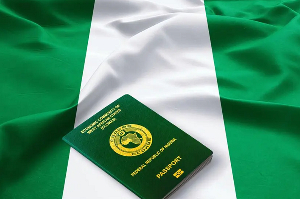- Home - Entertainment
- Lifestyle News
- Entertainment Videos | TV
- Year In Review
- Music News
- Entertainers
- Entertainment Archive
- Entertainment Photos
- Jokes
- Entertainment Headlines
- Ameyaw Debrah
- Brown GH
- Celebrities Buzz
- GH Base
- Ghana Celebrities
- Gh Gossip
- GH Page
- GH Splash
- Hot Gossip GH
- YEN

Tabloid News of Friday, 1 June 2001
Source: By Michael DeSenne
The Dark Side of Progress -419
THE ``NIGERIAN LETTER'' scam wasn't even on the radar screen when Internet Fraud Watch, a Washington, D.C.-based consumer-protection group, put out its list of top Web swindles for 1999. By 2000, the fraud ranked seventh. As of April 2001, it was No. 4 — and rising.
That's bad news, because this is one of the most nefarious con games ever conceived.
In some ways, the scam's relatively recent electronic proliferation is ironic. It has been around since the late 1970s, when crooks first began tucking poorly typed letters inside distinctive blue and red airmail envelopes. Later, the solicitations started spewing from fax machines. Only recently — nearly a decade into the Internet revolution — has the fraud entered the realm of email. The people behind this scam may be criminal masterminds, but they aren't exactly tech whizzes.
Even so, the swindle is starting to gather momentum. Fast. Susan Grant, director of Internet Fraud Watch, a project of the National Consumers League, says complaints of actual monetary losses stemming from the fraudulent emails were unheard of by her group until late 2000. The early trickle turned into a stream this year, and a full-fledged flood isn't out of the question. ``It's getting alarming,'' she says.
Needless to say, the move online makes sense. Email is cheap (no stamps, no stationery and no long-distance charges), and it offers easier access to a vast and rapidly growing pool of potential patsies. While it's difficult to quantify loses — many victims, out of fear or embarrassment, fail to report the theft — the U.S. Secret Service estimates that hundreds of millions of dollars are forfeited annually to the Nigerian scammers. A special Secret Service task force dedicated to quashing the Nigerian scam receives some 500 inquiries a day.
Despite the technological advances, the essence of the pitch hasn't changed much over the years: Someone purporting to be a Nigerian government official asks for assistance in temporarily moving a large sum of money offshore — usually into the bank account of the victim, who's told it's OK to accept the excess cash, often a result of ``overinvoicing,'' since it belonged to the ``past military government.'' In exchange for providing his or her account number, the victim is promised a cut of the booty, which is said to add up to millions of dollars. The scenario is often presented as legal, but of a ``delicate nature,'' so secrecy is of the utmost importance. This discourages the victim from involving friends, family, accountants, lawyers or anyone else who may recognize the fraudulent nature of the offer. Next, the perpetrators start siphoning the victim's bank account, or else convince him or her to shell out up-front payments for taxes and bribes. In the worst-case scenario, the victim is lured to Africa, where he or she faces the prospect of robbery, extortion, kidnapping or even murder. One unlucky American who fell for the ploy was killed in 1995 after going to Lagos to finalize a deal.
a Ghanaian man move a ``family treasure'' offshore. (The fraud, while originating in Nigeria, has since spread to other West African nations.) During six months of back-and-forth negotiations, the perpetrator appealed to the couple's Christian values, sucking them so deep that they even contacted a lawyer on behalf of the Ghanaian man and his family to help them emigrate to the U.S.
``By then he really had his hooks in her,'' says Grant. ``She'd made a major investment of time and [effort]. She'd looked into what was involved in transferring money from Africa.'' Since the couple wisely refused to provide bank-account information or pay up-front fees, the fraudster played his final hand and insisted they come to Africa. Three days before flying to Ghana to consummate the multimillion-dollar deal, the couple got cold feet and contacted Internet Fraud Watch, which talked them out of the trip.
``The lure of the money is a strong one,'' says Grant. ``[In this case], it overwhelmed what I think was a lot of common sense on their part.''
Tracking down the sophisticated swindlers, who hide behind fake names, dummy email accounts and stolen cell-phone numbers, isn't easy, but the Secret Service has had some success. The task force has two agents stationed in Lagos who advise local law enforcement and gather evidence for criminal prosecutions. Recently, says Jeff Winter, spokesman for the Secret Service, they helped an American recover from a Nigerian bank a substantial sum nearly lost to the deception.
Fortunately, most people who receive the electronic come-on recognize it for what it is — a rip-off. ``For me, it seemed blatantly obvious that it was a scam,'' says Joe Andrade, a 23-year-old college student in Bangor, Maine, who has received at least four of the Nigerian emails so far this year. ``I guess some businesspeople might fall for this, since it would make more sense for these Nigerians to choose someone more affluent to trust with their money. But why on earth would a young college student believe that some VIP from Nigeria would want to entrust them?''
Grant says the swindlers, faced with a near-endless supply of targets on the Web, are now employing more of a shotgun approach, rather than taking aim at small businesses as they have in the past. ``I don't think there's any real plan in who they decide to send them to,'' says Grant. ``If they get a hold of anybody's email address, it's worth a shot.'' Apparently so. Even though Grant is director of Internet Fraud Watch, she has received the solicitations on both her home and office email accounts.










